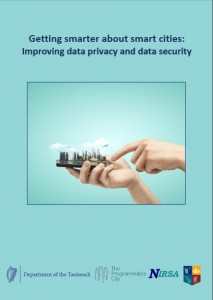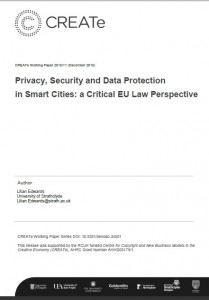We are happy to share the third set of videos from The Programmable City’s recent workshop “Creating Smart Cities”, Session 3: Privacy and security concerns in smart cities. [Session 1 here, Session 2 here]
Pseudonymisation and the Smart City: Considering the General Data Protection Regulation
Maria Murphy, Maynooth University
Abstract
The great promise of smart cities is tempered by the very real risks associated with the large-scale collection, sharing, and analysis of data. As the General Data Protection Regulation – set to apply from May 2018 – attempts to respond to the modern data processing environment, this paper considers the implications of the new Regulation for the smart city. In particular, this paper examines the introduction of a “privacy by design” mandate and considers the endorsement of pseudonymisation as a privacy enhancing technique. The “positive-sum” pro- privacy and pro-progress philosophy of the privacy by design approach would appear, on first inspection, to perfectly address the challenges of the smart city. In reality, of course, while privacy by design offers a helpful “mindset”, it is certainly not a panacea.
From start to smart: A 100 smart cities but where are the citizens?
Ayona Datta, King’s College London
Abstract
In January 2016, the Indian government announced the first 20 winners of its smart cities challenge. This is the start of the journey for these cities to becoming smart. As part of this challenge, each city developed a pan-city and area-based proposal to reflect their local context, resources, and priorities of citizens. At the end of this journey a total of 100 small to medium cities in India would have retrofitted their chosen urban areas with smart infrastructure, transport, housing and governance. The end of this journey for the 100 cities will seemingly mark the beginning of India’s new urban age.
In this paper, I search for the elusive citizens in India’s ambitious national urbanization programme of creating 100 Smart Cities. Examining the different smart city proposals submitted by the nominated cities for the smart cities challenge, I argue that each of these seek to present particular visions, imageries and fantasies of performing the smart citizen. These can be roughly presented as 1) Fast-tracked citizens- the near overnight production of a mega base of urban ‘population’ in each city for the mandatory citizen consultation in the smart city challenge. 2) Acquiescent citizens who contribute to open data, engage in e-governance and increase ‘civic discipline’ through citizen surveillance 3) Entrepreneurial citizens who contribute to economic growth and prosperity of the smart city, who are framed as careerist and heroic, but who individually and collectively take the risk and precarity of speculative markets on their shoulders.
Through these three figures, this paper will ask how the ‘citizen’ has become the biggest urban fantasy of India’s Smart city challenge, and what are the consequences of this fantasy. The answer to these questions will have profound consequences for the understanding of India’s urban futures and the urbanization of citizenships in the region.
[Video not available]
The Privacy Parenthesis: The Structural Transformation of the Private Sphere
Leighton Evans, University of Brighton
Abstract
The “Snowden Revelations” that revealed the extent of surveillance of everyday citizens in everyday life have been a focal event for discussion on the mediation of privacy itself in the digital age. As technological development moves towards the everyday integration of things in the “Internet of Everything”, this chapter focuses upon the shifting sense of privacy in spaces that were once considered “private” in light of the extraordinary levels of data collection continuing unabated in everyday life. To do this, I use the metaphor of parenthesis as a way of conceptualising the separateness of the private realm from other realms of human activity. The use of parenthesis here is in a dual articulation; parenthesis articulates both the separate nature of the private and problematizes the modern conception of privacy as a separate, private space linked to property ownership that is being challenged by digital media. Discussions on the “end of privacy” can be assimilated into this metaphor; in essence, this approach rejects the claim to an end of privacy but argues that privacy itself (here, the very nature of what lies in parenthesis) is changing from a spatial privacy to another, non-spatial form. This non-spatial privacy is characterised as intentional, mannered and performed, and is reflected upon with reference to the development of the smart city as a concept and phenomenal space.
From data subjects to data producers: negotiating the role of the public in urban digital data governance
Christine Richter (University of Twente), Linnet Taylor (Tilburg Institute for Law, Technology, and Society), Shazade Jameson (Independent), and Carmen Pérez del Pulgar (Institut de Ciència i Tecnologia Ambientals)
Abstract
Today’s smart city programs and systems bring private and public sector actors together in ways that are creating streams of data about citizens, and these streams inhabit a legal and practical grey area between the public and private domains. Digital traces from sensors and digital communications tools can be merged and linked with official records, volunteered data from apps, social media, and citizen feedback systems in ways that have implications for privacy and data protection. City authorities are not yet addressing the ethical implications of today’s data governance decisions: seemingly inconsequential data often contain intimate behavioural and locational traces, and all digital data produced by people have a long half-life, gaining in both financial value and sensitivity over time. As data become big data, existing rules and norms (such as the Fair Information Practice Principles) become unworkable, and regimes developed for analogue data are not easily updated for the era of ubiquitous computing, profiling and artificial intelligence. This creates new questions for urban governance: what elements of public life are private processes, and how can they be balanced with the benefits of sharing to create public goods, such as health and education? Cities are currently on the cusp of understanding the breadth of applications and potential of digital data for governance and functionality in urban space: city governments are likely to become an important hub for data exchange in the future, and to form part of the emerging international data market. How can city governments make informed choices about the kinds of infrastructures they set up, how can they understand the longer-term implications of those choices, and how do different infrastructures and processes to do with data build differing relationships between cities and citizens?




